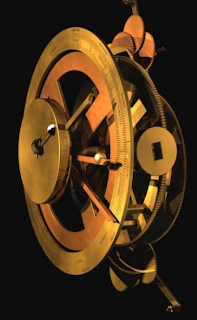 |
| Recreation of a Roman Merchant Ship |
I read an article on the BBC website this
week about an interesting archaeological find off the coast of Tuscany. In 1974
a Roman shipwreck was discovered which dated to circa 135 B.C. It was studied on and off during the 80s and
90s but it is only recently that one small find had been researched and
analyzed.
Part of the finds on the wreck, which was a
trading ship sailing from Greece around the Mediterranean, was a small tin box
containing six tablets that researchers have found to be Roman pharmaceuticals.
Scientists have analyzed the compounds in
the tablets and come to the conclusion that the medicine must have been used
for treating eye infections. You can read the full article HERE.
 |
| Pozzino Tablets credit: Giachi et al., PNAS |
It is amazing that the tin container
managed to keep these tablets intact despite being at the bottom of the sea for
almost two thousand years. What is also interesting to me is that Romans had
pharmaceutical pills just as we do today.
Most of the time, in movies or novels, the
ancients are shown to be mixing disgustingly smelly brews of various compounds
(some quite revolting) which they have to drink down while their faces twist up
at the vileness of the mixture. Kind of like my morning drink of organic
greens!
 |
| Tin Box from Pozzino Wreck |
But! Here is an example of tablets in a
little, ancient vitamin box. For the novelist, this is a great bit of detail
that can be added to a story, especially if you are writing about an ancient
doctor or healer, a sleuth investigating a poisoning, or even an addict of some
sort. It doesn’t all have to be opium!
Little archaeological finds can be real
gems in the rough of history.
There is another discovery that I have been
reading about for a while that also shared the fate of being overlooked in a
larger shipwreck find at first just because of its size and the mundaneness of
its initial appearance, a lump of corroded metal.
 |
| Front of Antikythera Mechanism Athens Archaeological Museum |
The Antikythera Mechanism, as it is called,
was found by sponge divers off the Greek island of Antikythera (between
southern Peloponnese and Crete) over a hundred years ago. It was a part of a
shipwreck that was said to have dated to first century B.C. The wreck also
contained several statues dating to the 4th century B.C. which were,
presumably, being taken back to Rome.
This find, when it was first discovered,
had archaeologists stumped. Some thought it could be a sort of astrolabe or clock.
In the last fifty years, researchers have made some new discoveries using
modern x-ray technology.
 |
| Back of Antikythera Mechanism Athens Archaeological Museum |
It seems that the device is dedicated to
astronomical phenomena and the cycles of the solar system, its gears and dials
making it the first analogue ‘computer’. There is even a dial that tracks the
cycle of the ancient Olympiads. Scientists say that nothing this advanced was
created for the next thousand years! To read more about the Antikythera
Mechanism Reasearch Project click HERE.
Back to the story teller in me. What an
amazing tale this device would make! The Antikythera Mechanism has been linked
to such names as Posidonius of Rhodes, Hipparchus and even Archimides but no
one knows for sure. Whoever created this device was brilliant and ahead of his
time and without a doubt, worthy of a story.
Is there any better combination than
history and fiction? I think not.
 |
| Recreation of the Antikythera Mechanism |
2 comments:
What a great insight into this snippet of history! You've inspired me to seek more historical research. I have a long-term project I work on from time to time involving pirates and although I've researched historical events, politics and even fashion, I hadn't thought about the micro objects like your analog computer. Thanks for the inspiration.
Happy to help with inspiration! It's amazing the little things one can stumble upon from time to time. I try to check certain archaeology websites and news sites like BBC regularly as there are often little gems of info lurking behind the headlines. The Antikythera Mechanism could certainly be the basis of an entire novel and because there is still so much that we do not know about the artefact, there is a lot more room for the novelist!
Post a Comment